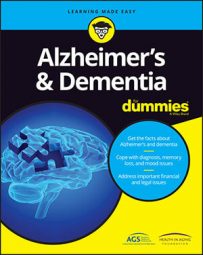Number 1: Memory problems that affect daily life
Forgetting the odd thing every now and again is perfectly normal as you get older; generally, you remember these things later. In dementia, you don't remember things later; those forgotten things are gone. Unfortunately, you need to remember things such as the following to be able to function normally every day:- Important dates and events
- The route taken on well-traveled journeys
- Where you've left important paperwork
- Names and faces of friends, neighbors, and work colleagues
Number 2: Difficulty with planning and problem solving
Co-author Dr. Atkins's grandmother could cook a turkey with all the trimmings with her eyes closed — until she started to develop dementia. As the disease took hold, her ability to time the cooking of meat and vegetables completely deserted her, and she'd regularly burn some of the vegetables while undercooking the meat. In the end, grandpa had to take over the chef's duties or everyone would regularly go hungry.As well as having trouble following recipes, people in the early stages of dementia may also
- Become confused using a debit card, credit card, or checking account
- Lose track of what their bank statement or credit card statement shows
- Have difficulty paying bills or filing taxes
- Become confused while trying to put gas in the car
Number 3: Problems finding the right word
Most people will have had the experience of frantically hunting for the right word when chatting with someone or, worse still, when giving a presentation to a group of colleagues. Eventually, the word comes to mind, the panic's over, and you stop feeling stupid.In early dementia, many people find that words regularly become elusive, leading to difficulty communicating effectively and to huge amounts of frustration. People with early dementia may also substitute the word they're after for something similar, such as a football becoming a kick ball, or a wristwatch becoming a hand clock.
People may also have problems following the thread of other people's conversations and may therefore become less inclined to join in and socialize with others to save themselves embarrassment. Socializing can become a particular problem in noisy environments or in situations where other background conversations are going on, because people with dementia find it harder to focus on the conversation that they're supposed to be having.
Number 4: Confusion about time and place
People with early dementia often lose track of time or become muddled about the date. They may also forget where they are or how they got there. As an example, a patient of Dr. Atkins's sat in the waiting room for ages, expecting to be called in for his appointment. Unfortunately, although he did have an appointment at that time, it was across town with his dentist.Number 5: Poor judgment
Another of the losses that occurs in early dementia is that of good judgment. Normally frugal people may end up spending money on things they don't need and can be a telemarketer's dream customer, signing up for all kinds of special offers.Judgment about appropriate dress may also suffer, with people heading off to the beach wearing a coat, hat, and scarf or, conversely, going shopping in the pouring rain with only a T-shirt and sandals to protect them from the elements.
Number 6: Visuospatial difficulties
Increasing clumsiness can herald the start of dementia. As people are robbed of their ability to judge widths and distances, falls and breaks are common, as are bumps (or worse) when parking or driving a car.Number 7: Misplacing things
Although everyone forgets where they've put their keys or cellphone from time to time, you can usually retrace your steps and eventually find them. This ability to retrace steps is lost in dementia. Coupled with an increasing tendency to leave things in the wrong place as well (such as slippers in the refrigerator), important objects go missing more often.Number 8: Changes in mood
As people grow into adulthood, extremes of mood and temperament thankfully tend to be much less evident than when they were teenagers. But in the early days of dementia, this type of fluctuating mood can return, with people often rapidly switching between extremes of sadness, fear, and anger. Low moods and depression are also extremely common in dementia. At times it can be hard to work out whether the symptoms of dementia are causing the depression or vice versa.Number 9: Loss of initiative
Although anyone can become fed up with work, hobbies, and even social obligations, it's often a passing phase after a tough day or a bad night's sleep, and you snap out of it. People with dementia may lose interest in taking part in their usual activities altogether and repeatedly need prompting about what they should be doing or simply to join in with what friends or family are doing.Number 10: Personality change
A number of different changes are possible here, and not all people who are developing dementia will change in the same way. In fact, often what changes is their normal behavior, so a reserved and quiet person may become flirty and disinhibited, whereas the life and soul of many an extrovert may become withdrawn and reclusive. Common changes include becoming- Confused
- Suspicious
- Withdrawn
- Angry
- Sexually disinhibited

